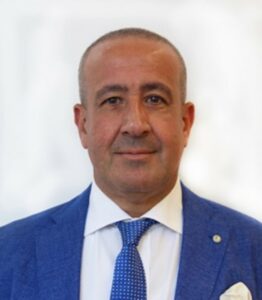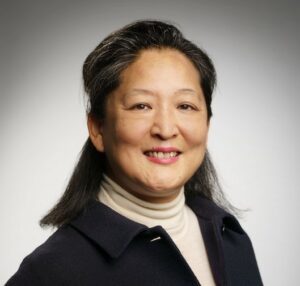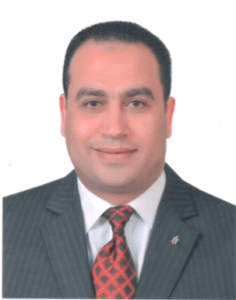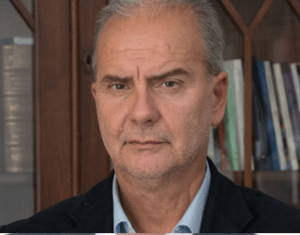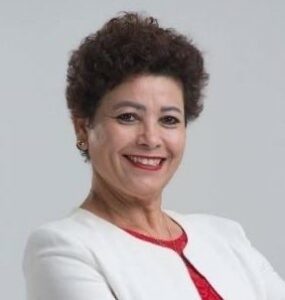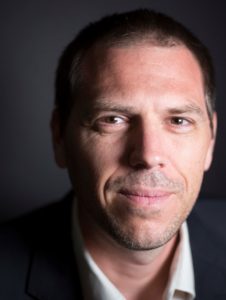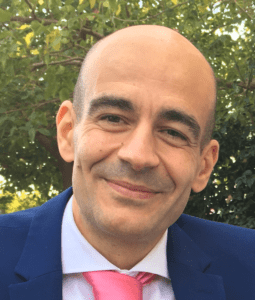Scientific Advisory Committee
The Scientific Committee (SAC) is the advisory body of PRIMA, established in accordance with the PRIMA Statute. The SAC supports PRIMA in providing scientific advice on the areas of work undertaken by PRIMA, such as advice on the scientific priorities to be addressed in the annual work plans, as well as commenting on the programme achievements. The SAC is currently composed of seven members – listed in Table – who provide expertise in all scientific, technological, socio-economic, and environmental subjects relevant to PRIMA. These fields of expertise include Water management, Food systems, Climate change, Farming, Plant physiology, and Environmental engineering.
The list of SAC members has been approved by written procedure in November 2021.
Maroun El Moujabber Chair of the SAC, Senior Officer at CIHEAM Bari since 2005. Previously was an associate professor in Lebanon and National Project Director of several FAO Projects on Protected Agriculture. At CIHEAM Bari, he coordinates a project on invasive pests in the Euro-Mediterranean area. He has extensive experience in Joint Programming in food security and natural resources management in Europe, the Middle East, and Africa. He is managing a Project on Gender Equality Plans and coordinating the Doctoral platform. | Lebanon |
Mi-Yong Becker Mi-Yong Becker is a professor of sustainability, with a focus on economics. Since March 2022 she Vice President for Sustainability, Transfer & Entrepreneurship at Bochum University of Applied Sciences. Previously, she worked as a scientist at the Helmholtz Centre for Environmental Research in the field of water research. | Germany |
Ayman El Shibiny Dr Ayman El-Shibiny is a professor of biomedical sciences, Director of the Center of Excellence for Food Research and Analysis, and Director-General for Research at Zewail City of Science and Technology. He got his PhD in Microbiology (Food Safety and Human Health) from the University of Nottingham in 2006 and worked as a postdoctoral fellow for four years in UK and USA. | Egypt |
Marco Bindi PhD in 1993 and Full Professor at the University of Florence since 2002. Lead Author of the 4 and 5 AR and SR 1.5 Warming of the IPCC. Author of more than 170 articles in international journals (Scopus H-index = 50). In the list of the 100 Top Italian Scientists (Natural & Environmental Sciences category), in the Global Highly Cited Researchers 2020 Clarivate ranking, and in the Reuters ranking of the 1000 most influential climate scientists in the world. | Italy |
Raoudha Gafrej Dr Ing. Raoudha GAFREJ is a hydraulic engineer who graduated from the National Engineering School of Tunis (1988), PhD in Earth Sciences graduated from the Pierre and Marie Curie University Paris VI (1993), and specialised in Environmental economics graduated from the Federal Polytechnic School of Lausanne (2006) and in Leadership of public policies, a graduate of South Mediterranean University (2019). | Tunisia |
Florent Chazarenc Florent Chazarenc is a PhD and Engineer in environmental engineering. He is working as a Senior Scientist and group leader at INRAE-research unit REVERSAAL. His research expertise is in wastewater treatment, emphasising low energy treatment systems and resource valorisation from industrial and domestic wastewater. | France |
Diego Intrigliolo Appointed by the UfM as its representative in the PRIMA SAC. Has a PhD in agronomy with more than 20 years of experience in research and innovation in agricultural water management. He is currently a senior scientist at the Spanish National Research Council (CSIC) within the Desertification Research Center (CIDE-CSIC-UV-GVA). | Spain |
| Ayman Diab-CHAIR of the SCIENTIFIC ADVISORY COMMITTEE | Dean of Faculty of Biotechnology – October University for Modern Sciences and Arts (MSA) – Egypt Professor Diab received his Ph.D. from Cornell University, College of Agriculture and life sciences, Ithaca, New York. He then was appointed as a Researcher and an Associate Professor at the Gene Expression and Regulation Technology Laboratory (GERT), Agricultural Genetic Engineering Research Institute (AGERI), Agricultural Research Center (ARC) in Egypt. After years of research at ARC, he was appointed as the President of the University of Modern Sciences (UMS) in Dubai, UAE. Professor Diab is a Visiting Professor in the School of Science at Greenwich University in the United Kingdom. His efforts in undergoing scientific researches were numerously awarded, where he received the National Encouragement Award for Advanced Technological Sciences that Serve the Agricultural Fields | Egypt | |
| Diego Intrigliolo- CHAIR of the SCIENTIFIC ADVISORY COMMITTEE | I have spent my career working on applied aspects of irrigation and water relations of woody perennial crops with the aim of improving on-farm irrigation efficiency, plant water use efficiency, and indeed water productivity. Currently, I am the Spanish national scientific expert for the programme committee for H2020 Societal Challenge 2 and a member of the PRIMA Joint Programme “Partnership for research and innovation in the Mediterranean area” Scientific Advisory Committee. I have a part-time contract with the Spanish National Research Agency (AEI) supervising evaluations within the agronomy and soil sciences area and I am serving as an associate editor for the Springer Journal Irrigation Science. | Spain | |
| Ghaleb Faour | Ph.D. in Engineering Science was obtained in 1995 from the University of Marseille III in France. Researcher, since 1996, in the Lebanese National Center for Remote Sensing (NCRS) and promoted to Director of Research since 2014. The Mainline of Research is the development of applied remote sensing technology in the sector of environmental monitoring and natural resources management. The national focal point for Lebanon in the United Nations Institute’s UN-SPIDER and UN Outer Space since 2010 in the sector of space research and activities.Vice President of the Governing Board of the Regional Centre for Space Science and Technology Education for Western Asia located in Jordan. | Lebanon | |
| Alex Rizzo | Main expertise is in vocational education & training (VET), grounded theory research on organizational behavior, and integrated water resources management. Alex presently acts as Deputy Principal for R&I, and was previously Head of the University College, at the Malta College of Arts, Science, and Technology (MCAST). Prior to this he had set up and managed the MCAST Institute of Applied Sciences. Alex’s previous engagements have included that of Deputy Chairman at the Malta Water Services Corporation (WSC), and he has taken on various engineering and management roles within the water sector for over 15 years. Alex presently heads a number of research and skilling projects relating to the efficient use of water, as well as in grounded theory research on organizational behavior. Alex is a Fellow and Chartered Member of the Institution of Engineering & Technology, the Chartered Management Institute, and the Chartered Institution for Water and Environmental Management | Malta | |
| Cesarettin Alasalvar | Is the Director of the Food Institute at TÜBİTAK Marmara Research Center in Turkey and is also an Associate Professor of Food Science and Engineering. He is also active in Horizon 2020 Programme and has been serving as Turkish Delegate of Societal Challenges II (Food Security, Sustainable Agriculture and Forestry, Marine, Maritime and Inland Water Research, and the Bioeconomy) of the Horizon 2020 Programme Committee since 2017. He also serves as an Associate Editor of Food Chemistry. He has received a number of international prestigious awards; including the IFT-Fellow Award (2012), the TÜBİTAK MAM – Most Successful Researcher Award (2012), the ISNFF Merit Award (2014), and Sabri Ülker International Science and Innovation Award on Food, Nutrition, and Health (2015), in recognition of his pioneering scientific achievements. | Turkey | |
| Françoise Lescourret | Françoise Lescourret, Director of Research at INRA Avignon, France, is a modeler in agro-ecology, in the area of horticulture. Her purpose is to contribute to the model-based design of ecological horticultural cropping systems. She has mainly worked on the interactions between fruit (quality included), plants, and pests, and their control by crop management. Currently, she develops modeling work to study and manage multiple ecosystem services in orchards, and she co-leads the INRA metaprogram on agroecosystem services. | France | |
| Alex Koutsouris | Is the Head of the Unit of Agricultural Extension, Rural Systems & Rural Sociology, Dept. of Agricultural Economics & Rural Development, Agricultural University of Athens. He has been the President of the steering committees of IFSA (International Farming Systems Association-European Group), ESEE (European Society/Seminar of Extension Education), and ETAGRO (The Hellenic Association of Agricultural Economists) as well as of the Hellenic Agricultural Organization (ELGO) DIMITRA. He has also been an expert with FAO and The World Bank. Currently, he is Co-Editor, The Journal of Agricultural Education & Extension, invited expert in the Strategic Working Group AKIS4 (EU Standing Committee on Agricultural Research), and member of the Scientific Advisory Committee of PRIMA. He participates/ed in several research and collaboration projects including the H2020 projects: AGRI-LINK (2017-2011); AgriDemo-F2F (2017-2019); AGRISPIN (2015-2017); member of the International Advisory Boards of the projects NEFERTITI and NEWBIE. | Greece | |
| Reema Tayyem | Obtained her BSc in biochemistry and MSc and Ph.D. in Human Nutrition from the University of Jordan. Professor Tayyem served as Clinical Nutrition and Dietetics Department chair and assistant dean at Hashemite University for about 8 years. She joined the Department in 2001and moved to Nutrition and Food Technology Dept. at the University of Jordan in 2016. She got UNESCO-L’Oreal Fellowship for Young Women in Life Sciences–2005. She performed her postdoc study at UCSD Cancer Center/the University of California, San Diego/CA/USA. Professor Tayyem got many awards and honors including Venus International Foundation Awards, Centre for Women Empowerment, Distinguished Woman in Nutrition–2017; Honor for the outstanding academic achievements at the Hashemite University (2015); Khalil Al-Salem Award for the Best Book in Nutrition and Food Technology “Handbook of Healthy Food Preparation and Storage”, Jordan, Amman (2015); Honor for the outstanding academic achievements at the Hashemite University (2014); and Honor for the production of low-protein flour from PKU Society, Jordan, Amman (2011). | Jordan | |
| Suzana Ferreira-Dias | is graduated in Agro-Industrial Engineering at ISA, she has an MSc in Biotechnology-Biochemical Engineering from the Instituto Superior Técnico (IST, School of Engineering) of the Technical University of Lisbon, a Ph.D. in Agro-Industrial Engineering (ISA), and got the Habilitation (ISA) in 2004. She has more than 250 publications/communications including 85 publications cited in ISI Web of Knowledge, with a total of 1265 citations (982 without self-citations), and an index of 22. She is also the author or co-author of 13 chapters in international books, 12 manuscripts in international books of proceedings, 12 papers in national books or periodicals non-ISI, 30 manuscripts in national books of proceedings non-ISI, more than 100 abstracts in international books of proceedings, and 3 Portuguese patents. Suzana Ferreira Dias was distinguished with 8 scientific prizes and two professional distinctions. Since 2010, she is associate editor of the Journal of the American Oil Chemists Society. | Portugal | |
| Rajko Vidrih | graduated in food science and technology (1984), defended his Ph.D. thesis in postharvest physiology (1996). He has more than 30 years of experience in the field of fruit and vegetable storing and fat processing. From 2015 he is a full professor of plant food technologies, giving lectures in technologies of plant food at BSc, MSc, and Ph.D. level at Biotechnical Faculty, the University of Ljubljana (programs of food technology,) and at the University of Banja Luka, faculty of agriculture. His professional interests include postharvest physiology of fruits and vegetables, the nutritional value of fruit and vegetable as influenced by the production system, application of natural antioxidants in fat processing, and determination of trans fatty acids in food. His recent scientific activities include assigning of the geographical origin of fruit and vegetable, application of hot water dipping of fruits, and study of postharvest application of LED light on fruits. | Slovenia | |
| Dietrich Borchardt | Since 2017 Research Director “Water Resources and Environment” and since 2007 Head of the Department “Aquatic Ecosystem Analysis and Management” at the Helmholtz-Centre for Environmental Research – UFZ in a joint position as Full Professor for “Aquatic Ecosystem Analysis and Management” at Technische Universität Dresden (TU Dresden). Aquatic Ecology: Experimental research using controllable model systems (mesocosms); multiple stressors, interactions with and impacts on biota (macroinvertebrates and fish), resource competition and primary production across environmental gradients; elucidation of factors controlling natural attenuation of pollutants, in situ measurement of metabolism and nutrient turnover; sensing of matter fluxes; indicators and proxies for ecosystem metabolism and integrity Hydro-ecological modeling: cross compartment modeling of water quality; linking hydrological and ecological process models environmental assessments: indicators for aquatic ecosystem states and functions; data and model-driven assessments; analysis of natural and anthropogenic drivers, pressures and impacts across scales (regional to global)Environmental management: sustainable management of coupled human-environmental systems in network and catchment perspectives; advancement of integrated water resources management | Germany | |
| Estella Prukner-Radovčić | DVM in 1981, Mr.sc. in 1987, Ph.D. in 1990 – all at the University of Zagreb, Croatia. Specialist in poultry science – Diplomate EUPVS; Head of the Department of Poultry Diseases with Clinic (2006 – 2009); Head of the postgraduate study; Head of the reference laboratory for Chlamydia; President-Working group on zoonoses in the HAH. Area of scientific interest: microbiology, zoonoses, food safety, avian diseases. Head of 12 research projects; supervised 7 Ph.D. candidates; published over 190 scientific papers and several books; associate in one patent; winner of several international awards for innovation. President of the European Federation of the World Poultry Science Association.Representative in The EU COST DC; Program Committee member in Horizon 2020-SC2; member of the PRIMA Foundation SAC; full member of the Croatian Academy of Medical Science. | Croatia | |
| Giuseppina Crescimanno | Giuseppina Crescimanno is a full professor at the Department of Agricultural, Food and Forestry Sciences of the Palermo University (www.unipa.it), where she is currently teaching “Irrigation and Drainage”. She got her Ph.D. in “Production Ecology and Resources Conservation” at the Wageningen University (The Netherlands), by defending the thesis “Irrigation practices affecting land degradation in Sicily”. She coordinated the European Project: “An integrated approach for sustainable management of irrigated lands susceptible to degradation/desertification”. She contributed to the European “Soil Thematic Strategy for soil protection” (Monitoring soil erosion in Europe and Desertification), also coordinating the Working Group: “Links with organic matter and contamination working group and secondary soil threats”. She was appointed “Head of Science” at the UNESCO Office in Venice in 2007, where she worked until September 2008, also organizing and convening the Workshop “Needs and Priorities for Research and Education in Biotechnology applied to emerging Environmental Challenges in SEE Countries”. Her research activities focused on the topics: Sustainable management of water and soil in arid regions; Irrigation scheduling and strategies under saline and drought conditions; Impact of climate change on cropping systems; Soil salinization and desertification. She is currently carrying out research aimed at investigating the effect of biochar on the physical and structural properties of differently textured soils. | Italy | |
| Mouad Chentouf | Mouad Chentouf received an M.S. degree in Animal Production from the agricultural National School, Morocco, and a Ph.D. degree in Veterinary Science from the University of Namur, Belgium. He is currently Research Director and Head of the Regional Centre Tangier at the Institut National de la Recherche Agronomique(INRA) of Morocco His research has focused on goat and sheep breed evaluation, small ruminant assisted reproduction, and production systems analysis. Mouad has published numerous scientific publications on these topics and has coordinated several national and international research projects. He has also invited professor of animal production and a member of several scientific committees. | Morocco | |
| Latifa Bousselmi | Latifa Bousselmi is an Engineer, Ph.D., HDR, and Professor at the Centre for Water Research and Technologies, CERTE in Tunisia. She is the head of the Laboratory of Wastewater and Environment and has built over thirty years of expertise in the water sector. In addition to technological and innovation aspects, she is also interested in the field of water governance and integrity. She has implemented, as coordinator and partner, several international projects targeting the Med region funded by the European Union and others institutions. She has published several impacted scientific papers and organised international conferences. She is co-founder and president of the NGO “Research in Action, REACT”. Latifa is a member of the PRIMA Joint Programme “Partnership for research and innovation in the Mediterranean area” Scientific Advisory Committee | Tunisia | |
| Charalambos Hajipakkos | Chief Water Officer Water Development Department Ministry of Agriculture, Rural Development and Environment | Cyprus | |
| Elazar Fallik |
| Israel | |
| Lakhdari Fattoum |
| Algerian |

